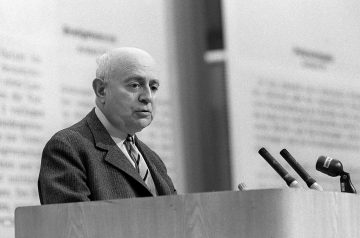
Peter E. Gordon in The New York Review of Books:
The German philosopher and social theorist Theodor W. Adorno died fifty years ago this week, in the late summer of 1969. Even at the time of his death, he was entangled in controversy. Student militants, many of them aligned with the so-called “extra-parliamentary opposition,” had once seen him as a political ally. But when they occupied the Institute for Social Research at the Goethe–University Frankfurt, where Adorno kept his office, he called in the police, an act that was seen as unforgivable by the student radicals: How could a theorist of anti-fascism side with the authorities?
Adorno’s decision opened a bitter divide between the so-called Frankfurt School and the more militant members of the student movement that would never truly heal. In late April 1969, when Adorno commenced the first of his lectures on “An Introduction to Dialectical Thinking,” two students rushed the podium, demanding that Adorno engage in a public act of self-criticism. Three female students then showered him with flower petals and bared their breasts. The aging professor fled the hall, and students distributed a leaflet: “Adorno as an Institution is Dead.”
A month later, in an interview for Der Spiegel, Adorno remarked on the irony that in a piece of political theater he had been cast in the unlikely role of a cultural conservative: “To target me, I who have always positioned myself against every kind of erotic repression and sexual taboos!” Adorno tried to resume instruction in June, but further protests prevented him from lecturing.
More here.
